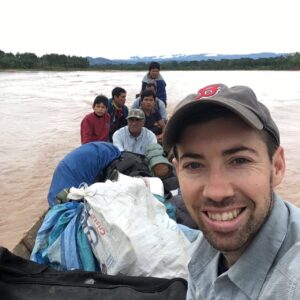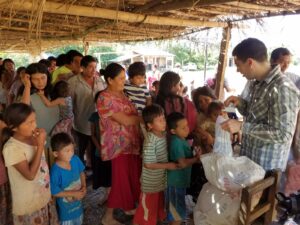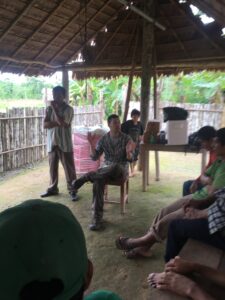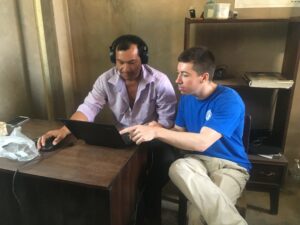Engaged Anthropology Grant: Asher Rosinger

While a doctoral student at the University of Georgia, Athens, Asher Rosinger received a Dissertation Fieldwork Grant in 2013 to aid research on “Hydration Strategies, Nutrition, and Health During a Lifestyle Transition in the Bolivian Amazon,” supervised by Dr. Susan Tanner. In 2019 Dr. Rosinger had the opportunity to return to the field when he received an Engaged Anthropology Grant to aid engaged activities on “Water and Hydration in the Bolivian Amazon: Reinforcing Traditional Strategies to Reduce Water-Related Morbidities.”
The Wenner-Gren Dissertation Grant supported my doctoral research examining hydration strategies, nutrition, and health during lifestyle transitions in the Bolivian Amazon among Tsimane’ forager-horticulturalists. The search for safe water has been and continues to be a critical problem facing humanity. The majority of this indigenous population, like 884 million people worldwide, currently lacks access to clean water and consequently has high parasite loads and high rates of dehydration.

The overarching aim of this engagement project, building on findings from 12 months of dissertation fieldwork in 2 Tsimane’ communities in Lowland Bolivia, was to return to the research communities to provide hydration and water treatment educational and training workshops which will be reinforced through radio programs disseminated to all Tsimane’ communities. Through these workshops and radio program, I hoped to increase awareness and training to reduce water-related morbidities, specifically diarrheal diseases and dehydration, suffered by Tsimane’ children and adults. This engagement project had 3 main components and took place in May 2019 over 3 weeks.
First, I held a meeting with the Grand Tsimane’ Consejo, the governing Tsimane’ council which holds political power and is based in the town nearest the Tsimane communities (San Borja), to discuss the engagement project. During this meeting, I revisited the results I provided them at the conclusion of my dissertation fieldwork (preliminary findings and water quality analysis results, which indicated that the river and streams were heavily contaminated with pathogenic bacteria) with updates on new results and discussed all facets of the proposed workshop. At this meeting, the Consejo requested that instead of posters, they and the communities would rather have radio programs translated into Tsimane’ about these findings, rather than posters since these radio programs are far-reaching and they re-play them and people simply enjoy them more. Therefore, I felt it was a critical component of the engagement project to make this change.

Next, I visited the two communities where I conducted my dissertation research, including one community that takes two days of river travel to visit. At both communities, I conducted an educational workshop based on my findings that focused on safe hydration practices, how much water is necessary in this environment, and water treatment techniques. This workshop actively engaged in discourse with community members about additional challenges they face in cleaning water in their daily lives. It also reinforced these messages and information built on the 12 months of fieldwork, which included in-depth qualitative interviews on these topics, in a culturally-meaningful and understandable way. We did this in a fun workshop in which I also provided a community feast.
In addition, I provided starter kits and new jerry cans (the preferred means of water transport) with lids that people can not put their hands into since this is a key way that water containers become contaminated for families. I provided these new jerry cans to all households in the two communities with instructions of how to use and maintain the kits to clean water and where to purchase replacement materials in San Borja.

Finally, I worked with a Tsimane’ translator to translate the presentation of the results from the workshop to a radio program. This translation was then reviewed and approved by the Grand Tsimane’ Consejo. It was then recorded at the Horeb Radio station, where they recorded the radio program and are playing it twice a week for the next month. The radio program was divided into three parts: 1) it discusses the importance of water, the symptoms of what happens when an individual does not drink enough water and they are dehydrated and how dehydration affects the body; 2) it discusses the best ways to rehydrate, including traditional, preferred rehydration practices of Tsimane’; and 3) it discusses different options to clean water, focusing on boiling water and using chlorine as well as appropriate dosages.
Overall, the Engaged Anthropology Grant provided me with an important opportunity to revisit the site of my dissertation research and re-engage with those communities. While I had been back once previously since my dissertation, and I had provided the results back to the communities as I was conducting my dissertation research, this trip felt different since it was all dedicated to the workshops. People were really happy to see me and happy for the opportunity to learn more about hydration and water issues and to tell me what they needed. I felt like what I was doing was as important as all the research I conducted. I think it will be critical to continue to build in these types of workshops in all future research I conduct as a way to stay engaged with the people who are most directly tied to the research.